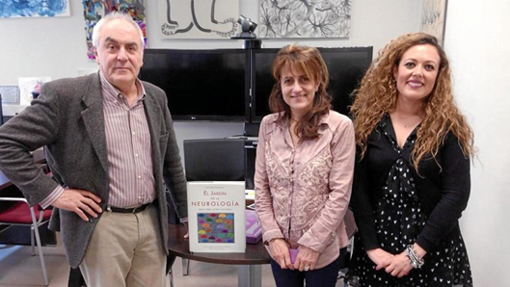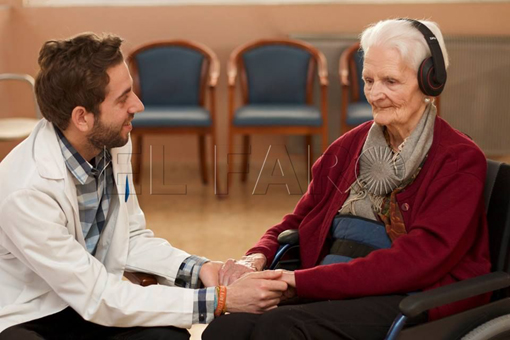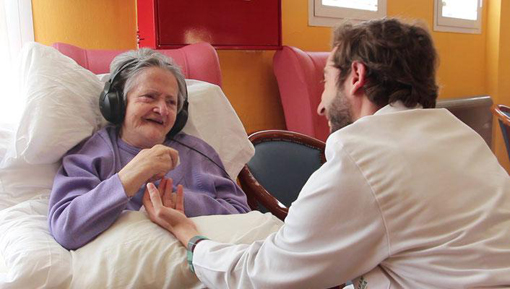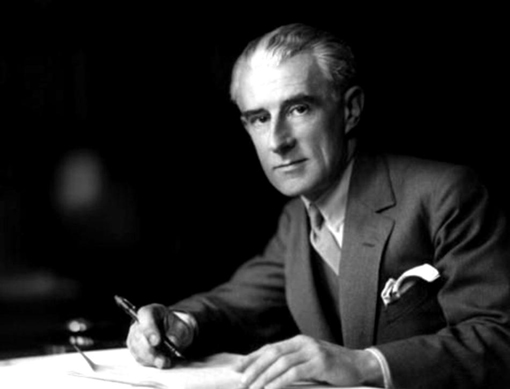Last weekend I saw a story related to elderly people and I automatically knew that I wished to share this news with you. I know that other times I have talked about elderly people and specifically about Alzheimer's --as it is the case with this news--; but I like to talk about elderly people again, because they inspire me with tenderness, tranquility --I need it, because I have many things to do each day and I lack time-- and goodness --something that makes me think well of them always--.
To illustrate this news, I would like to put here the link of a Spanish song; but I think I do not have permission to do it.
Why would I like to put on a song? ..., because this song (“Penélope”, by the Spanish singer, Juan Manuel Serrat) is one of the favorite songs of a lady, Encarnación, who is being treated with music therapy. It is curious that she recognises the melody, just by hearing the first chords but, despite being able to sing each verse without making a mistake, she does not remember where she lives, in what year she was born or the name of her mother, and faces that were once familiar and close to her, now they are strangers. Encarnación is 79 years old and she has had Alzheimer's for three years. Maybe you can look for that song on the Internet.
There are numerous neuroscientific researches, that reveal the relationship, which borders on the magic, between music and Alzheimer's. The melodies and lyrics of the songs clearly slow down the loss of memory and improve the language.
The latest study, presented the last week, has been conducted by the association “Alzheimer Leon” and concludes that patients, in the most advanced stages, are those who offer a more obvious and powerful emotional response to music, with an effect that is more than beneficial for their mood and well-being.
The manager of the “Alzheimer León” centre, Flor de Juan, explains the following: "We developed a musical reminiscence therapy, using photographs and other biographical elements, to bring the favorite singers to the present; in one group, we listened to music and, in the other one, without it, through bracelets associated with electrodes, we checked the brain response to the musical stimuli, surprising and very striking in cases of advanced Alzheimer's".

The Researcher Javier de Felipe, the Manager Flor de Juan and the responsible of Cooperacion Patricia Alvarez
'Dos gardenias', by Antonio Machín, and 'Mi carro', by Manolo Escobar, were some of the themes chosen by the relatives of fifty patients with mild, moderate and severe illnesses, who participated in the study, as references of their musical memory. They are some songs from their youth.
The effect on the brain is immediate. When they hear the music, they quickly awaken from the absorption that invades them in many cases, react, cry, laugh, concentrate and fix their lost gaze. "It is as if they were once again in the world", says De Juan.
With musical listening, positive automatic responses are developed at two levels: cognitive and emotional. These are effects that occur even in people with almost total amnesia, severe aphasia (inability to communicate) and without mobility.
"Patients, who do not speak anything and who no longer attend to stimuli, can sing a whole song", says the person responsible for Alzheimer León, adding that it is not something sporadic, but common in patients with advanced stages.
Of course, the reaction only occurs with songs recognised by them, those that are part of the soundtrack of their lives.
Magdalena Galindo (clinical psychologist in an specialised day care, in Badajoz) agrees on the “absolute power" of music, in people with dementia. She recalls the case of Luisa, a patient in severe phase and with high silence, capable of singing ´El clavel' (´The carnation') by Rocío Jurado, from start to finish

Magdalena Galindo
"It was impressive. When she stopped singing, she just stopped talking", she says, to emphasise that music reinforces their self-esteem, because "only with it , they are they able to remember happy stages of their lives".
It also helps them to focus, to concentrate, in such a way that music is also used as a preliminary phase to develop other treatments and activities, as says Kruz Rodríguez, occupational therapist of a health care centre of Alzheimer's, in Madrid.
"When the group is revolutionised or dispersed, I play music and immediately they calm down, listen to me and focus listening. Its power is total", he says.
Rodríguez has used classic therapies, in his therapies, themes that everyone remembers, sung as nannies, to relax them; but also other types of melodies, that stimulate them, for example, to draw or perform other cognitive or physical activities. They are very useful, he says, old commercials with recognisable music: "It transports them to their past".
One of the first questions to family members and the patients themselves, to face their individualised treatment, is: “What are your favorite songs?”.
Each patient, with dementia, is a world and the evolutions are very diverse, derived from very different and complex factors, but there are common patterns. In relation to the senses, the first thing they lose is smell and the last, almost always, is the ear.
Although it may seem like magic, that someone sings but does not speak, it has a strong scientific basis. The last areas that are eliminated, in a brain devastated by the disease, are two: the ones in charge of the musical memory and those that allow to feel emotions.
The music is recorded in different areas from the rest of the memories and, while all those areas are filled with darkness, which translates into forgetfulness and cognitive deterioration, the musical storage area endures vivid with the passage of time.
Pepe Olmedo, health psychologist and musician, is promoter of the initiative 'Music for awakening', which has trained 40 centres and 600 professionals, throughout Spain, in the application of melodies to the well-being of the sick.
Pepe studied in the University of Granada (South eastern Spain) and he started working as a volunteer, at the "Cáxar de la Vega" senior centre, with the help of workers, residents and relatives. Now he is part of a group of 4 members (Aaron Rodriguez, Mar Olmedo, Eloisa Araujo and him). They are trying to share their philosophy with many people, many centres and institutions. They have come to many places in Spain: Asturias, Zaragoza, Madrid, Granada, Cádiz, Tenerife, Barcelona, Basque Country, Seville, Malaga ..., as well as abroad (San José, Costa Rica).

Pepe Olmedo with a patient
Pepe and his colleagues have not found any patients, who do not react to a greater or lesser extent before the music.
The improvement of the patients is such that even, in some occasions, the pharmacological treatments are reduced.
His project focuses especially on those with more severe behavioral disorders: aggressiveness, constant irritability, severe agitation, sleep disorders, ambulation without direction and paranoia. The cases that have most impacted him are those of those with "coma-like" states, who "open their eyes when they hear their songs".
By the way of that, I can tell you that, last Thursday, I saw on TV the case of a footballer (Francesc Peralta), from the Mequinenza (in Aragón, Northeast Spain), who suffered a blow to the head, playing a match, on January 21, and he has been in a coma, until a few days ago; and Francesc has left the coma thanks to his family, who began to sing the Anthem of Seville --which Francesc loves--, by the Spanish singer, El Arrebato. Francesc regained consciousness and his girlfriend put the Anthem for him; then Francesc sang it whole.

Francesc Peralta with a reporter
Like Francesc Peralta, Concha (a lady who was in an advanced stage of Alzheimer's) woke up thanks to her favorite music. While the music was playing, she tried to sing, was excited, laughed and asked.
"At the end of her life, a woman adjusted her breathing with music and relaxed, she died with her song", says this Psychologist (Pepe Olmedo), who, like all the professionals interviewed, agrees that "music is as effective as kisses or hugs".
"Music allows access to the past, it is like a key that opens that door and lets them remember in some way", says Eva Muñoz, music therapist, psychologist and family therapist at the Alzheimer Spain Foundation, which recommends caregivers and family members to use music as a tool, but also alerts on wrong or excessive use.

Pepe Olmedo with Concha

Eva Muñoz
"It is not about playing music all the time and now. Sometimes it is not good to overstimulate. You have to know the moments, study each patient, be attentive to reactions, because they can overwhelm them and lead them to traumatic moments", she explains; and she adds that "well used" there is nothing so powerful to communicate with serious ill.
She develops joint therapies with the patient, together with its partners and relatives, to express, through music, feelings that, otherwise, it is not capable of. In this way, the caregiver is also helped.
The "musical recipe" can be, therefore, as effective as the pharmacological one, although not substitutable, this music therapist makes clear.
She points out that, by way of music and its section in the brain, which remains "almost intact" of dementia, can be opened, and it is already being done, research ways to try to know more about why the disease and, above all, the possibilities for improvement and slowing down its progress.
All experts agree that Alzheimer's progresses "always" in a "fierce" way and that "it is impossible to put a dam", but the musical barrier is "strong" and, above all, very "effective".
One of the most revealing cases, about the binomial music and dementia, comes from the hand of Maurice Ravel, one of the most influential composers of the 20th century. He suffered from Pick's disease (a type of dementia with multiple similarities to Alzheimer's).

Maurice Ravel
With a state already advanced, he heard a piece of music that caught his attention and exclaimed: "How ingenious! It is like a gigantic crescendo. Who will have made it?". The ingenious piece was none other than his famous 'Bolero' from 1928.
Like so many sick people, he got emotional with the music, but was unable to remember that each note had come from his own head.
Well, all these stories seem incredible to me; but I do not doubt that they are true, because I love music, I can not live without it and that is why it is no surprise for me its power in people who lose their lives, for one reason or another one.
Until my next post, kind regards,
Luis.
Sponsored by Costaluz Lawyers.
Please click below:
